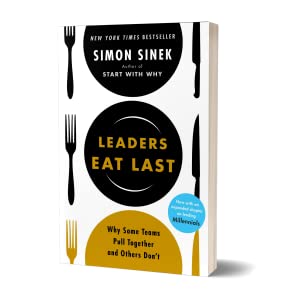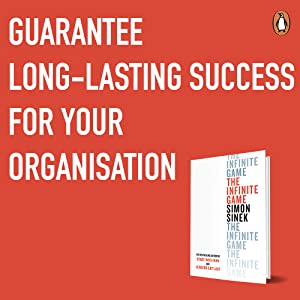Servicios al cliente
Sobre nosotros
Copyright © 2024 Desertcart Holdings Limited



Full description not available









A**V
A whole new viewpoint
Amazing introspection by the Author. Very easy to read and brilliantly relevant to what is happening in todays business Environment, how organisations are running after numbers and making investors happy rather than identifying their vision and working on it. Must read for those who want to make an impact in their area of expertise.
B**N
Powerful
Simple yet powerful if we put to practise. And like most good things the kick off would be the most challenging. The narration has been simple to understand with enough examples to give you clarity on the concept. What I would have loved to see was a quick starter, where one can get some pointers where to begin.
T**A
Some leaders run a sprint, while others participate in relay race in the endless game!
Simon has based this book on the initial work by Prof. James Carse (Finite and Infinite Games: A vision of life as play and possibility), and clubbed it with otherwise known management work by likes of Jim Collins, Brown Berne, Adam Grant, to put together a compelling narrative in support of Cause-driven, visionary leaders, who believe in organization building for long run (aka level 5 leaders).Simons’ basic premise is that leaders either operate with infinite mindset or finite mindset. The book shows how the two kinds of leaders differ in their decision making, team building and managing change and there are leaders from corporate world used to exemplify both kinds.In finite game- the goal is to win before the game ends, in infinite game, the primary objective is to keep playing, to perpetuate the game. Finite games are between known players, played with well-defined rules and with clarity on how will winner be decided? Infinite games are played between known and unknown players, within general broad conventions and broad boundaries and players are free to join in or drop out at any time. The game of business fits into the definition of an infinite game, while a particular organization may or may not play with infinite mindset.Infinite-minded leader works to ensure that employees, customers and shareholders remain committed to contributing through effort, wallet and investments, allowing organisation to serve its stated just cause- the vision it strives for through every action.Organisations led by Finite-mindset Leader depicts: Obsessive focus on quarter results, winning over competition key motivation, negotiable ethics, non-cooperative suffocating culture, in-human managers & profits before everything else. Finite-minded leader plays to end the game-to win.Finite-minded players worry about disruptions, infinite-minded players expect surprises and even revels in them, for the aim of the first is to develop a stable company, for the later a resilient company.Simon has identified five five essential practices that would help develop infinite mind-set: (why only five? Why only these – cant say!)1. Importance of associating with a Just Cause- Essentially it is about having and truly believing in the Vision or Purpose of existence of the organisation- wherein all choices, decisions and resources are directed to serve that cause. There are enough ways to find out, whether the stated cause or mission runs in the veins of the organisation or used as seductive marketing slogan. Infinite mindset gets attached with the Cause to such an extent - self-interests gets subsumed. Simon beautifully illustrates how the US Declaration that all men are created equal, has been reinterpreted to break all barriers over time including race, gender, geography, opportunity and sexual orientation and the perfect vision of equality is still work in progress. Simon provides some suggestions on how to ensure that JUST CAUSE is defined right to have the necessary pull, tangibility and relevance over infinite time-horizon. Redefining CEO as C-Vision-Officer with CFP and COO as associates is an interesting suggestion. If you know your why? (courtesy Simon earlier book) you would naturally gravitate to the associated cause or vision.2. Infinite mindset involves selecting a worthy rival and use his/its existence to learn and improve oneself and once ahead, find another rival to stay motivated on the continuous evolutionary journey. Instead of choosing a competitor who you want to win basis some outcome metrics (sales, market share, etc), worthy rivals may a form a set of comparing organisations with each one doing particular things better and forces one to focus on multiple opportunities for improvement. Simon mentions US predicament in managing rivals in Coldwar 2.0 in the form of North korea for nuclear threat, China for economic challenge and Extremism for ideological supremacy, requiring different response than earlier world of Coldwar, where USSR seems to be representing all rivalry folded in one competitor.3. Existential flexibility comes naturally to the infinite-mindset leaders as they are focused on serving their Cause and welcome any development that would helps accelerate achieving that vision and do course change without much lament about sunk cost, or wasted efforts. This kind of flexibility in not easy to come-by leaders that are playing finite game to meet certain outcome metrics in predefined period- to them this is unwelcome distraction to be ignored or restrict its influence on the existing course.4. Leaders with Infinite mindset focus on building trusting teams- where members are open to share bad news, seek help and share variant perspectives, while feeling psychologically safe that their actions will not be used against them. Finite leaders create a sense of fear and mistrust within team as each member acts to safe his back, often resulting in hiding information and avoidance of accountability. Finite metrics as dominant part of performance system within organisations tend to promote finite mind-set, resulting in organisations often celebrating high performers who may have severe trust deficit within their teams and peer group. Simon would prefer low performers with high trust than high performers with low trust score, while both sets may be worthy of coaching stint.5. Courage is the essential requirement for anyone interested in moving away from the established norms, prevailing paradigms or simply trying do something tha would upset the resent set-up. Hence, Courage finds mention in almost all How-to and paradigm-redefining books, including this one.Standard examples like Apple, Microsoft, Blackberry, Kodak, United Airlines etc- are so often used by almost all management thinkers to prove their hypothesis,. Clearly these success stories and failures are not likely to be attributed to one-thing they their leaders or these organizations did right or not- although quest for simple explanation continues among thinkers and researchers.In conclusion, the book may not be presenting any novel idea or incisive insights but is reassuring for those already leading with infinite mindset and for others, it provides enough provation to self-examine one motives and realign their leadership intent.
M**A
A book for million dollars leaders
Must read book. Book bring completely different insights of leadership. Running after numbers is always many organizations are driving but Simon shows the correct way. Hats off to Simon for such courageous writings. He has openly challenged the type of leadership of best in the business. If you read book and you have to go through this.
P**R
Very happy with this book!
I have all three versions of this book: Audible, Kindle and physical copy...and that's because I want to keep reading it as it makes a lot of sense. My beliefs are confirmed with this book. Thank you, Simon.
T**R
Intellectual read
Insightful book. Author Simon Sinek is a brilliant marketer. Must read for top leadership at corporates. Is a good gift option too.
K**A
Amazing Experience
This book is a marvel in developing an infinite mindset. I recommend it to all leaders inspirational, and everyone who loves to live a fulfilling life. Thank you Simon Sinek, as always you nailed it❤️❤️.
Trustpilot
Hace 2 meses
Hace 1 semana